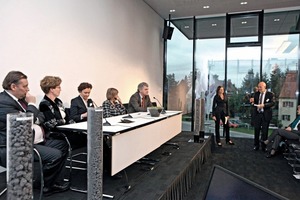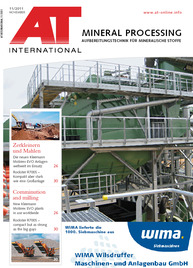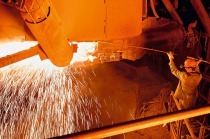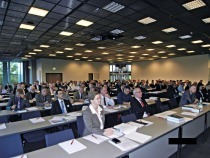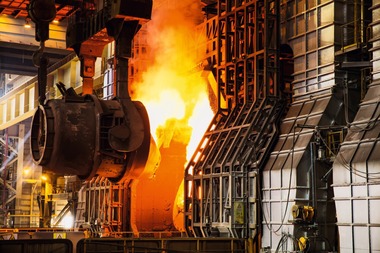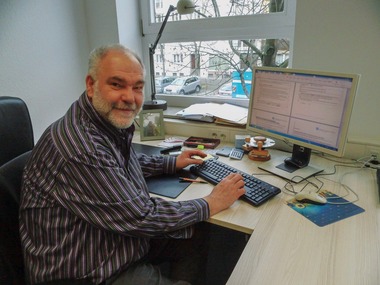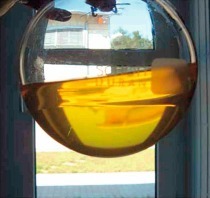First slag symposium in Meitingen - a great success
Dr. Michael Heußen, Managing Director of Lech-Stahlwerke GmbH and initiator of the first slag symposium in Meitingen, did not expect such a response. More than 160 experts participated in the special conference at the SGL Group Forum, which was organized by the Neuruppin-based renowned publishing house TK-Verlag Karl J. Thomé-Kozmiensky. “All the important steelmakers from Germany and Austria as well as important representatives of the building and recycling industries took part. Unfortunately, some of the representatives of citizens’ action groups and authorities explicitly invited were missing,” Dr. Heußen commented on the structure of participants at the conference.
When the idea was created, many lecturers spontaneously expressed their readiness to take part in the symposium. Prof. Dr. Dr. h.c. Karl J. Thomé-Kozmiensky from Berlin Technical University, who has been organizing the renowned Berlin Waste Management Conferences for more than 30 years, and Prof. Dr. Martin Faulstich (Fig.) from Munich Technical University, who is also the Chairman of the Council of Environmental Advisors, undertook to head the conference scientifically. Martin Zeil, the Bavarian Secretary of State for Trade and Industry, agreed to become the patron after he had already underlined the importance of the raw material supply of Bavaria during this year’s raw material summit. “We will need a change in raw material policies similar to the change in energy policies. It is madness to see how many raw materials we are wasting”, said Dr. Markus Söder, the Minister of the Environment, during this year’s Bavarian raw material summit in July. It is just this point where the Lech-Stahlwerke (steel works) want to set a positive example for the German steel industry and to demonstrate new directions. The only steel mill in Bavaria has already recycled more than 26 million tons of steel since its existence. Slags are generated as by-products during steelmaking. In the future they will play an important role on the way to a complete recycling management. “It’s hard to imagine our society without steel. Growth, innovation and also climate protection are based on steel. However, there is no steel without slags!” Dr. Heußen put it in a nutshell, as regards steel production. So far slags from metallurgy live in the shadows. Slags from the electric furnace were even made into a problem in Bavaria after citizens’ action groups were formed relating to the steel works. But it was exactly these people who did not accept the invitation which surprised the organizers as well as Dipl.-Ing. Georg Geißler, the Managing Director of Max Aicher Environment, who said: “We are continuously developing new processes and possibilities of use for slags. The sustainability of the raw material and its environmental compatibility are the most important aspects for us.” Max Aicher Environment is one of the processing and recycling plants for slags from electric furnaces in Germany offering different recycling building materials to their customers, which are used, for example, in building projects.
Prof. Dr. Armin Reller from the chair of resource strategy at Augsburg University expects other possibilities of utilization of slags for the future. In his lecture dealing with the recovery of raw materials from slags he showed how many raw materials are still in slags, which could be used for the recycling management. Amongst others, Prof. Dr. Heidi Foth, member of the Council of Environmental Advisors at the Institute of Environmental Toxicology at Halle University, talked about the ecological aspects. This was a special concern of the organizers to inform the public. The final panel discussion also dealt with ecological aspects. However, Dipl.-Ing. Georg Geißler missed not only local politicians from Meitingen but also other political representatives from the district and from Bavaria as well as representatives of citizens’ action groups and of environmental non-governmental organisations: “For example we invited the Association for the Protection of Nature, representatives from politics and from citizens’ action groups to take part in the discussion. The panel discussion would certainly have been a good framework for a constructive dialogue. Incomprehensibly they did not make use of it.” Participants from the whole of Germany and neighbouring countries said that it was a successful event and that the lectures were an expansion of their own work. “The symposium provided an excellent overall view of the existing potentials for slag utilization and its contribution to resource efficiency”, explained Dr. Rolf Ostertag, Vice Director of the Würzburg-based Fraunhofer-Institut.

